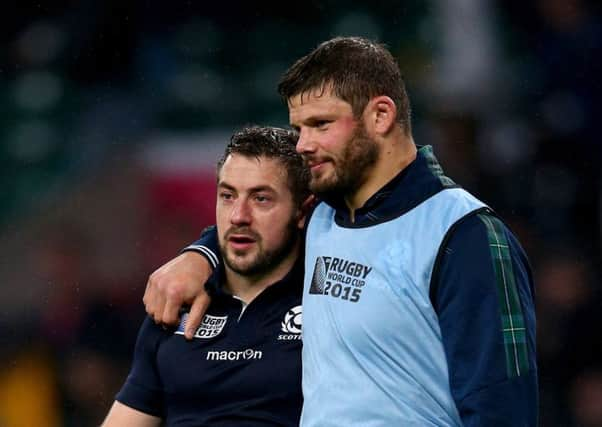Allan Massie: Toast Six Nations if it’s glass half-full


End of story, except for this reminder: rugby union is a devilishly complicated game to referee, and things happen in the blink of an eye. So indignation comes quickly too, but should be set aside on reflection. Some of Mr Joubert’s questionable decisions went against Scotland, some in our favour. That’s it, over and done with.
One often groans when coaches or players say there are positives to be taken from a defeat, but not this time. First, we ran Australia as close as it’s possible to get without winning, and Australia are a very good team indeed.
Advertisement
Hide AdAdvertisement
Hide AdSecond, this was our best World Cup performance in the professional era, the first time we have come within a whisker of beating one of the three southern hemisphere giants in the tournament. Even in 1999 when we had a very good team – that year’s Five Nations champions – South Africa and New Zealand beat us by comfortable margins, as did Australia in the 2003 quarter-final.
Third, this is a young team with loads of room for improvement. Perhaps only Sean Lamont of the 31-man squad will not be about for the 2019 World Cup in Japan. Some say that Greig Laidlaw and Ross Ford will also have gone by then, but there are players several years older than them in this year’s New Zealand and South African squads.
That’s the glass half-full side. The half-empty one is that we have known several promising Autumns followed by miserable Springs. We were quite cheerful last November. Some pundits, even in England, were saying we were the Six Nations dark horse, and nobody needs reminding what happened next.
Yet we would be real gloomy pessimists if we didn’t think it should be different this time. The forwards were mastered only by South Africa. Otherwise they more than held their own, and were on top in the set scrum against an Australian pack which had dominated England and Wales. Then the backs have shown an ability to score tries. Not all of these have been created, but when players snatch opportunities as often as Tommy Seymour and Mark Bennett have done, it’s fairer to credit them with mental alertness rather than to speak of luck.
Then there is reason to believe that Vern Cotter’s experimental period is over, that he now knows his best XV and best match-day squad. A good international team is never a closed shop, but the best ones show few changes in personnel. That was the case with Clive Woodward’s World Cup-winning side. It’s been the case with Warren Gatland’s Wales and with Ireland over the last few years. In these teams there have been few changes except when players were injured.
If – a big if – there are no injuries, Cotter’s team to face England in the opening Six Nations match may well be last Saturday’s, with only one change, Alex Dunbar at 12 instead of Peter Horne, admirably though Horne played.
There are, of course, things to work on. Scotland tackled bravely, but the defensive alignment was sometimes wrong. It was too narrow, admittedly after Australia had been battering at the wall, when Drew Mitchell found lots of space to score his first try. Then there is our recurrent failure to deal competently with kick-offs and restarts, and to execute an efficient exit strategy. No other Six Nations side, let alone New Zealand, South Africa or Australia, makes a mess of the opposition restarts as often as we do. We score only to concede a score far too often. Finally, we are still too often insecure in fielding the high ball.
On the other hand if, as one hopes, this World Cup indicates that success now and in the future lies with a team capable of playing a fast running, passing and off-loading game, we look to be at least as well equipped to play in that style as any of our Six Nations rivals, indeed better equipped than most to do so.
Advertisement
Hide AdAdvertisement
Hide AdThis is partly because Gregor Townsend has had Glasgow playing this way, with the consequence that players at international level are not being asked to do something with which they are unfamiliar. Of course weather conditions in a northern winter or spring sometimes demand that you play a more restricted game, but Glasgow have shown they can do that too when it is necessary.
Finally, the spirit and resolution – the sheer will to win – that Cotter’s team has displayed bodes well. Reinforced by the confidence which comes from achievement and by the recognition that concentration must be maintained for the full 80 minutes, this spirit can take this Scotland side a long way. Its first goal must be the 2016 Six Nations title; it’s not beyond them.